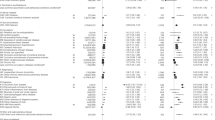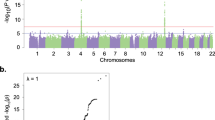Abstract
Alcohol use, particularly alcohol abuse and dependence, are associated with increased risk of depression. Current diagnostic criteria suggest that the relationship is causal, but the evidence has only been derived from observational studies that are subject to confounding and bias. Given the logistic and ethical constraints that would be associated with a trial of alcohol use to prevent depression, we aimed to complete a Mendelian randomization study to determine if a genetic polymorphism associated with alcohol abuse and dependence (ADH1B rs1229984 G→A) contributed to modulate the risk of depression in a community-derived cohort of older men. This retrospective analysis of a cohort of 3873 community-dwelling men aged 65–83 years living in the metropolitan region of Perth, Western Australia, investigated the triangular association between the rs1229984 G→A polymorphism and alcohol use and, after 3.2–8.2 years, the presence of current depression or history of depression. The mean number of standard drinks consumed per week (n; standard deviation; range) according to genotype was AA 1.8 (17; 2.7; 0–7), GA 5.9 (262; 7.5; 0–35), GG 8.5 (3594; 10.9; 0–140) (GG>AA, GG>GA; P<0.001). Consumption of 1 or 2 drinks per day decreased the odds of depression (n=610) by 30 and 40%, whereas consumption of more than six drinks daily more than doubled the odds of depression (odds ratio: 2.12, 95% confidence interval: 1.02, 4.40). The ADH1B rs1229984 G→A polymorphism was not associated with current or past depression (P=0.857). In addition, the presence of the A allele did not interact with the alcohol use to modulate the risk of depression (P=0.725). These results suggest that alcohol consumption does not cause or prevent depression in older men.
This is a preview of subscription content, access via your institution
Access options
Subscribe to this journal
Receive 12 print issues and online access
$259.00 per year
only $21.58 per issue
Buy this article
- Purchase on Springer Link
- Instant access to full article PDF
Prices may be subject to local taxes which are calculated during checkout

Similar content being viewed by others
References
Lim SS, Vos T, Flaxman AD, Danaei G, Shibuya K, Adair-Rohani H et al. A comparative risk assessment of burden of disease and injury attributable to 67 risk factors and risk factor clusters in 21 regions, 1990–2010: a systematic analysis for the Global Burden of Disease Study 2010. Lancet 2012; 380: 2224–2260.
Rehm J, Baliunas D, Borges GL, Graham K, Irving H, Kehoe T et al. The relation between different dimensions of alcohol consumption and burden of disease: an overview. Addiction 2010; 105: 817–843.
Rodgers B, Korten AE, Jorm AF, Jacomb PA, Christensen H, Henderson AS . Non-linear relationships in associations of depression and anxiety with alcohol use. Psychol Med 2000; 30: 421–432.
Graham K, Massak A, Demers A, Rehm J . Does the association between alcohol consumption and depression depend on how they are measured? Alcohol Clin Exp Res 2007; 31: 78–88.
Boschloo L, Vogelzangs N, van den Brink W, Smit JH, Veltman DJ, Beekman AT et al. Alcohol use disorders and the course of depressive and anxiety disorders. Br J Psychiatry 2012; 200: 476–484.
Hasin DS, Grant BF . Major depression in 6050 former drinkers: association with past alcohol dependence. Arch Gen Psychiatry 2002; 59: 794–800.
Fergusson DM, Boden JM, Horwood LJ . Tests of causal links between alcohol abuse or dependence and major depression. Arch Gen Psychiatry 2009; 66: 260–266.
Prescott CA, Aggen SH, Kendler KS . Sex-specific genetic influences on the comorbidity of alcoholism and major depression in a population-based sample of US twins. Arch Gen Psychiatry 2000; 57: 803–811.
Sullivan LE, Fiellin DA, O'Connor PG . The prevalence and impact of alcohol problems in major depression: a systematic review. Am J Med 2005; 118: 330–341.
Davey Smith G, Ebrahim S, Lewis S, Hansell AL, Palmer LJ, Burton PR . Genetic epidemiology and public health: hope, hype, and future prospects. Lancet 2005; 366: 1484–1498.
Edenberg HJ . The genetics of alcohol metabolism: role of alcohol dehydrogenase and aldehyde dehydrogenase variants. Alcohol Res Health 2007; 30: 5–13.
Li D, Zhao H, Gelernter J . Strong association of the alcohol dehydrogenase 1B gene (ADH1B) with alcohol dependence and alcohol-induced medical diseases. Biol Psychiatry 2011; 70: 504–512.
Bierut LJ, Goate AM, Breslau N, Johnson EO, Bertelsen S, Fox L et al. ADH1B is associated with alcohol dependence and alcohol consumption in populations of European and African ancestry. Mol Psychiatry 2012; 17: 445–450.
Norman PE, Flicker L, Almeida OP, Hankey GJ, Hyde Z, Jamrozik K . Cohort profile: the Health In Men Study (HIMS). Int J Epidemiol 2009; 38: 48–52.
Holman CD, Bass AJ, Rosman DL, Smith MB, Semmens JB, Glasson EJ et al. A decade of data linkage in Western Australia: strategic design, applications and benefits of the WA data linkage system. Aust Health Rev 2008; 32: 766–777.
Holman CD, Bass AJ, Rouse IL, Hobbs MS . Population-based linkage of health records in Western Australia: development of a health services research linked database. Aust N Z J Public Health 1999; 23: 453–459.
Almeida OP, Almeida SA . Short versions of the geriatric depression scale: a study of their validity for the diagnosis of a major depressive episode according to ICD–10 and DSM-IV. Int J Geriatr Psychiatry 1999; 14: 858–865.
Almeida OP, Yeap BB, Hankey GJ, Jamrozik K, Flicker L . Low free testosterone concentration as a potentially treatable cause of depressive symptoms in older men. Arch Gen Psychiatry 2008; 65: 283–289.
Adams WL, Garry PJ, Rhyne R, Hunt WC, Goodwin JS . Alcohol intake in the healthy elderly. Changes with age in a cross-sectional and longitudinal study. J Am Geriatr Soc 1990; 38: 211–216.
Lipton RI . The effect of moderate alcohol use on the relationship between stress and depression. Am J Public Health 1994; 84: 1913–1917.
O'Connell H, Chin AV, Cunningham C, Lawlor B . Alcohol use disorders in elderly people--redefining an age old problem in old age. BMJ 2003; 327: 664–667.
Gea A, Martinez-Gonzalez MA, Toledo E, Sanchez-Villegas A, Bes-Rastrollo M, Nunez-Cordoba JM et al. A longitudinal assessment of alcohol intake and incident depression: the SUN project. BMC Public Health 2012; 12: 954.
Almeida OP, Pfaff JJ . Depression and smoking amongst older general practice patients. J Affect Disord 2005; 86: 317–321.
Hesselbrock VM, Hesselbrock MN, Workman-Daniels KL . Effect of major depression and antisocial personality on alcoholism: course and motivational patterns. J Stud Alcohol 1986; 47: 207–212.
Dixit AR, Crum RM . Prospective study of depression and the risk of heavy alcohol use in women. Am J Psychiatry 2000; 157: 751–758.
Acknowledgements
National Health and Medical Research Council of Australia (NHMRC) project grant numbers 279408, 379600, 403963, 513823 and 634492.
Author contributions
Almeida conceived, designed the experiments, analysed the data and drafted the manuscript. All authors performed the experiments and reviewed the manuscript for important intellectual content and approved its submission for publication.
Disclaimer
The sponsors had no role in the design and conduct of the study; collection, management, analysis and interpretation of the data; or preparation, review or approval of the manuscript.
Author information
Authors and Affiliations
Corresponding author
Ethics declarations
Competing interests
The authors declare no conflict of interest.
PowerPoint slides
Rights and permissions
About this article
Cite this article
Almeida, O., Hankey, G., Yeap, B. et al. The triangular association of ADH1B genetic polymorphism, alcohol consumption and the risk of depression in older men. Mol Psychiatry 19, 995–1000 (2014). https://doi.org/10.1038/mp.2013.117
Received:
Revised:
Accepted:
Published:
Issue Date:
DOI: https://doi.org/10.1038/mp.2013.117
Keywords
This article is cited by
-
The brain structure, immunometabolic and genetic mechanisms underlying the association between lifestyle and depression
Nature Mental Health (2023)
-
The alcohol flushing response is associated with the risk of depression
Scientific Reports (2022)



